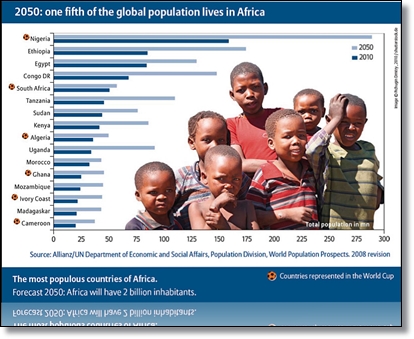Africa’s Population: Untapped Potential for Development

 |
The UN is now focusing on ways to ensure sustainable development, development that meets the needs of the present without compromising the ability of future generations to meet their own needs. Many malign population growth as an obstacle to sustainable development. We hear about famines and drought and slums and abject poverty. We read such alarming “facts” about the dangers of Africa’s growing population. Let’s stop and ask ourselves some pertinent questions: Is the increasing population a problem? Or does Africa’s growing population hold untapped potential for development?
Africa has the second highest population after Asia. Children and youth make up the majority of the populace in Sub-Saharan Africa. For example, in Kenya, young people are close to 75% of the population; likewise, Uganda has the youngest population in the world, with a fertility rate of 6.2 children.
This is something to celebrate. We need to start viewing young people as human capital, not as mouths to feed. We need to identify what it is that people need to flourish, which can ensure sustainable development.
To address high unemployment, we need to provide citizens with basic education, entrepreneurship training, and vocational and technical training. Both governments and the private sector need to invest in training and education, with a particular focus on tertiary education, innovation, and technology. Business and entrepreneurship must be paramount as we make our way toward Vision 2030 in Kenya. Industrialization should be evenly distributed throughout the country, and not only in urban areas; this will ensure that we address the problems of rural-urban migration. The solution is not reducing the size of the population, as that does not ensure that the people we do have on this planet are equipped with the tools necessary to join the workforce.
Further, it is a fallacy that food production is too low. Paul Ehrlich’s warnings of global famine in Population Bomb were proven wrong. With proper planning and as a result of human ingenuity, food production is more than sufficient.
We must end corruption. This will boost efforts towards poverty alleviation, ensuring aid and development effectiveness that will promote ownership, transparency, and accountability.
We must implement policies that ensure development, including developments in healthcare, sanitation, and improvements in ending hunger and poverty. The Kenyan Government has recently taken a positive step forward in its new policy on free maternal healthcare for all women across Kenya. We applaud this and hope that more progress ensues, and that more countries in Africa will prioritize the human person in their policies.
The push to control population through contraception is a short-term “solution” and does not address the real issues. The focus must be on maximizing human capital and implementing policies that accomplish this goal. If we rely on population reduction policies that do not tackle the underlying problems, how can we be sure that small populations won’t face the exact same problems?
Youth need to be at the centre of these positive steps forward, as they are the future and will be the main beneficiaries of development.
Africa’s greatest resource is the human person and the creativity each person brings. To be successful, progress in development for Africa must recognize this fact.
By Hannah Ondiek
The author [email protected] is the Director for Africa of World Youth Alliance, an international organization that promotes the dignity of the human person through policy, culture, and education and that has special consultative status with the United Nations and European Union, among other institutions.
